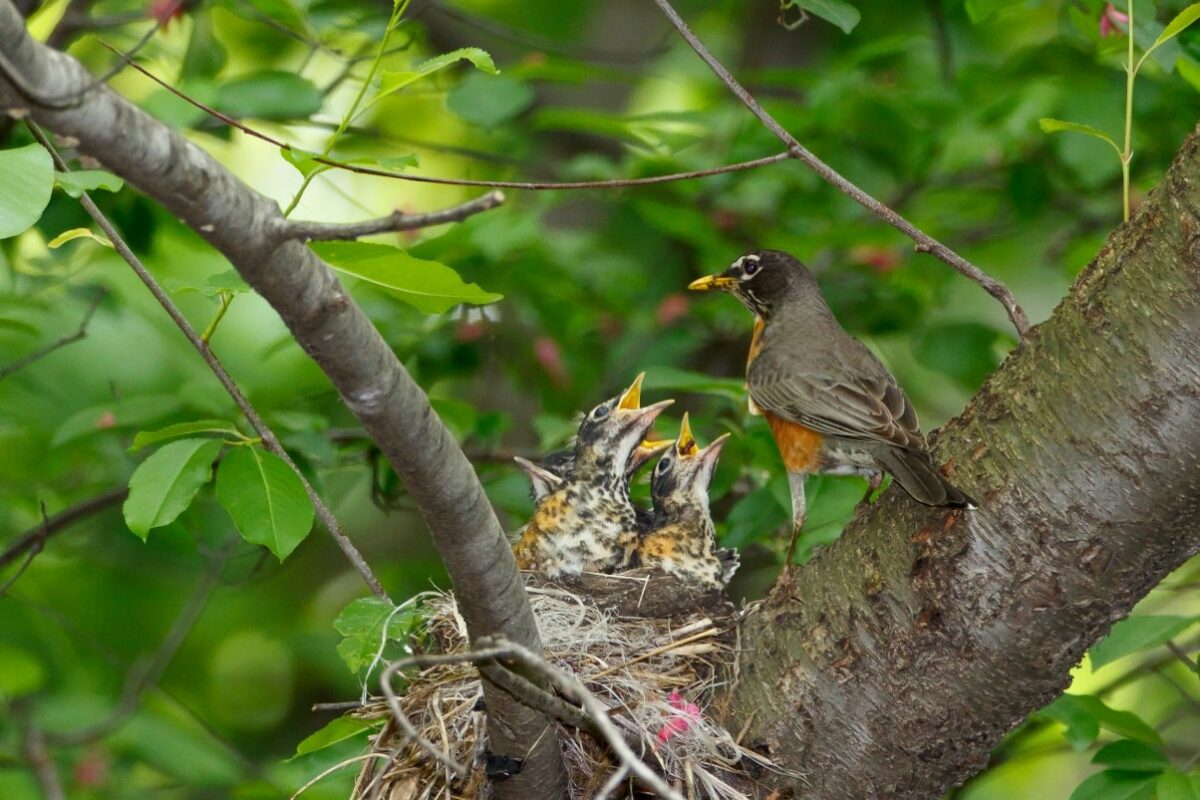If you’re a bird-watching enthusiast and had the opportunity to observe a bird nest closely, you’ve probably noticed that some birds eat their babies’ poop.
Shortly after the adult feeds the nestling, the baby turns its rear end to the mother and delivers an odd white thing, which the mother catches with its bill and then swallows it. Sounds gross, right?! So why don’t adult birds even flinch while eating these?
The white things baby birds release right after eating are called fecal sacs. Some adult birds choose to eat the fecal sacs because they are, in fact, highly nutritious for them. They may also eat them to avoid leaving the nest.
If you think that’s weird, wait until you finish reading the article! You’re about to discover some jaw-dropping details about a baby bird’s pooping behavior! Although many aspects of this behavior will sound gross, they’ll make you admire birds more than ever!

Table of Contents
Why Do Birds Eat Their Babies’ Poop?
Baby bird poop should always be removed from the nest. The thing is, some birds choose to get rid of it by eating it because it’s highly nutritious.
During the nesting season, adult birds are quite stressed and often do not have time to care for themselves and eat accordingly, so they take advantage of their babies’ poop. It has been proven that females consume baby poop more often than males, as their food intake is typically less nutritious.
Additionally, parents may choose to eat their babies’ fecal sacs to avoid leaving them alone in the nest.
But what exactly does baby bird poop contain that prompts adult birds to eat it? Baby bird poop is, in fact, called a fecal sac because it doesn’t contain feces only. The poop is actually surrounded by a white mucous membrane with a dark end.
This membrane is of excellent help to avoid the nest from getting dirty and, therefore, helps parents avoid the accumulation of pathogenic microorganisms. Additionally, the removal of these fecal sacs prevents predators from finding the nest.
Why Are Fecal Sacs Nutritious?
As mentioned, some bird parents choose to eat the fecal sacs instead of throwing them away. Scientists believe this happens because baby fecal sacs are highly nutritious.
A study focused on examining 173 feces belonging to corn bunting nestlings (Emberiza calandra) showed they were filled with invertebrate remains and cereal grains.
This phenomenon is more common in altricial young that are born quite undeveloped, and their digestive systems cannot process all the food, and therefore the fecal sacs contain remains of what the babies are fed. Consequently, the parents can benefit from the nutrients and energy stored in the fecal sacs.
Once the babies mature, however, most parents stop eating their fecal sacs, as their digestive system becomes increasingly stronger and therefore, capable of digesting food properly. In fact, when they’re mature enough to fledge, baby birds stop producing fecal sacs.
A study on mockingbirds showed that the parents stopped eating their babies’ fecal sacs once the young were only six days old. After this, the adults carried the fecal sacs away from the nest. Robins probably eat their babies’ poop only during the first few days after hatching, too.
Now you’re probably wondering why the parents aren’t affected by the bacteria in the poop? If it’s dangerous to leave the fecal sacs in the nest, why is it not harmful for the parents to ingest it?
That’s where the white mucous membrane plays its role. Scientists argue that it protects the bird’s skin and feathers from bacteria. Once it reaches the gut, the bird’s digestive system can handle the bacteria well.
Poop Eating – A Protective Behavior
As mentioned, another reason for parents to eat their babies’ poop is to avoid leaving the young unattended. If both the male and the female care for their young, this may not be a problem, as they can exchange duties.
On the other hand, if only one parent provides parental care, it would probably do its best to avoid leaving its kids alone, and eating their poop could reduce the time spent away from the nest.
Why Do Baby Birds Eat Then Poop Right After?
Studies have shown that baby birds poop right after eating because that’s what their instincts tell them to do to avoid poop piling up in the nest.
Scientists observed 159 nests of 8 bird species for more than 400 hours and concluded that nestlings’ defecation times depend rather on feeding times than on gut processing times.
As such, the nestlings scientists observed pooped right after being fed because the parents were there to clean the poop.
Upon these observations, scientists argued that nestlings possess a strong plasticity in defecation time as they can alter the whole physiological process so that defecation occurs when parents are around. Even if the parents feed their nestlings at different times, they still poop only after eating. Isn’t this fascinating?!
